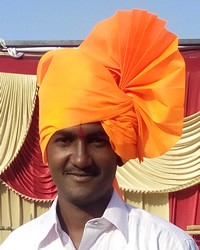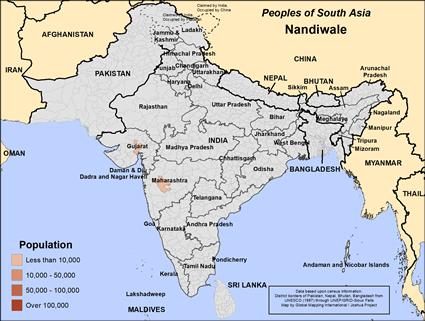Nandiwale in India

Photo Source:
Anonymous
|

Map Source:
People Group data: Omid. Map geography: UNESCO / GMI. Map Design: Joshua Project
|
| People Name: | Nandiwale |
| Country: | India |
| 10/40 Window: | Yes |
| Population: | 1,400 |
| World Population: | 1,400 |
| Primary Language: | Telugu |
| Primary Religion: | Hinduism |
| Christian Adherents: | 0.00 % |
| Evangelicals: | 0.00 % |
| Scripture: | Complete Bible |
| Ministry Resources: | Yes |
| Jesus Film: | Yes |
| Audio Recordings: | Yes |
| People Cluster: | South Asia Hindu - other |
| Affinity Bloc: | South Asian Peoples |
| Progress Level: |
|
Introduction / History
The Hindu Nandiwale people live in western India, primarily in Maharashtra and parts of Gujarat. Historically, they have worked as cattle herders and traders, known for their role in maintaining and managing livestock, particularly bulls and oxen. Over time, the Nandiwale have diversified into other forms of labor, but their connection to cattle herding remains significant in some areas.
What Are Their Lives Like?
Many Nandiwale families continue to work with livestock, managing cattle and oxen for agricultural purposes or as part of local trade. In addition to cattle herding, some families engage in small-scale agriculture or manual labor, supplementing their income with work in nearby towns and cities. The community often works together, with family members sharing responsibilities in tending to cattle, farming or other labor activities.
In rural areas, Nandiwale villages consist of close-knit communities. Families live in homes built from locally available materials such as mud, brick and thatch. Their daily lives revolve around work, family and religious observances with cattle herding and labor forming the core of their economic activities. While some younger members of the community have pursued education and employment in urban centers, most Nandiwale continue to live in rural areas, upholding traditional ways of life.
What Are Their Beliefs?
The Nandiwale people practice Hinduism and observe major religious festivals such as Diwali, Holi and Ganesh Chaturthi. They worship deities like Shiva Vishnu and local gods associated with cattle and agriculture. Temples and local shrines serve as focal points for religious activities, where families gather for worship and rituals.
The Nandiwale people also honor their cattle through specific rituals, offering prayers for the health and well-being of their animals, which are central to their livelihood. Their religious practices are closely linked to their daily work with cattle and reflect the importance of agriculture and livestock in their lives.
What Are Their Needs?
The Nandiwale people face several challenges, including limited access to education, healthcare and economic development opportunities. Many families rely on traditional cattle herding and farming methods, which leave them vulnerable to environmental changes, such as droughts or the loss of grazing lands. Access to modern agricultural techniques, veterinary services for livestock and sustainable practices would help improve their livelihoods.
Education remains a key need, particularly in rural areas where schools are often under-resourced. Expanding educational opportunities and providing better infrastructure would allow younger generations to pursue alternative career paths. Healthcare services are also limited, with many Nandiwale families traveling long distances to access medical care. Developing healthcare infrastructure and improving access to essential services would significantly benefit the community.
Prayer Points
Pray that the Lord would send laborers to the Nandiwale people.
Pray that the Holy Spirit would open their spiritual eyes so they can see Jesus.
Pray that the Lord would awaken spiritual hunger in them to seek the truth, leading them to Jesus himself.
Pray that an awakening in the people will be contagious and the entire community would find Christ together.